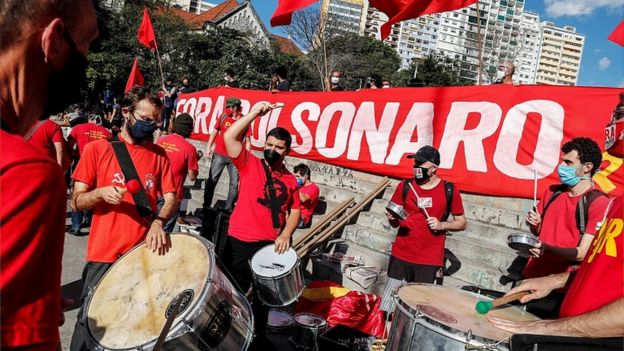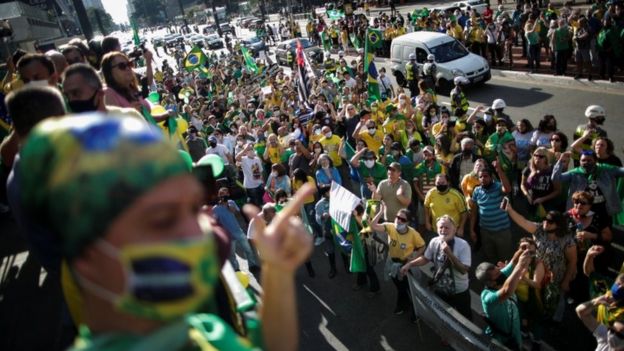www.aljazeerah.info
News, June 2020
Archives
Mission & Name
Conflict Terminology
Editorials
Gaza Holocaust
Gulf War
Isdood
Islam
News
News Photos
Opinion Editorials
US Foreign Policy (Dr. El-Najjar's Articles)
www.aljazeerah.info
|
Editorial Note: The following news reports are summaries from original sources. They may also include corrections of Arabic names and political terminology. Comments are in parentheses. |
501,262 Deaths and 10,080,224 Corona Virus Infections, Mostly in the US, Brazil, UK, Italy, France, Spain, Mexico, and India
June 27, 2020
 |
 |
|
Opponents of Brazilian President took to the streets in Sao Paulo, June 2020 |
Supporters of Brazilian President took to the streets, June 2020 reut.jpg |
As of June 28, 2020, 01:22 GMT
World: 10,080,224 Infection Cases, and 501,262 Deaths
***
A list of countries with the highest Coronavirus (Covid-19) deaths:
1 USA 2,596,537 infection cases, and 128,152 deaths.
2 Brazil 1,315,941 infection cases, and 57,103 deaths.
3 UK 310,250 infection cases, and 43,514 deaths.
4 Italy 240,136 infection cases, and 34,716 deaths.
5 France 162,936 infection cases, and 29,778 deaths.
6 Spain 295,549 infection cases, and 28,341 deaths.
7 Mexico 212,802 infection cases, and 26,381 deaths.
8 India 529,577 infection cases, and 16,103 deaths.
9 Iran 220,180 infection cases, and 10,364 deaths.
https://www.worldometers.info/coronavirus/
***
WHO Director-General's opening remarks at the ACT Accelerator launch
26 June 2020
Good morning, good afternoon and good evening.
Yesterday, we celebrated the end of the Ebola outbreak in the Democratic Republic of the Congo.
Many of the same public health measures that have been successful in stopping Ebola – like case-finding, isolation, testing, contact tracing and respectful care – are the same measures that countries are now deploying against COVID-19.
But we have also had a tool in the fight against Ebola that we do not yet have for COVID-19: an effective vaccine.
Without it, there is no doubt we would have had more cases, and more deaths.
It’s clear that to bring COVID-19 under control, and to save lives, we need effective vaccines, diagnostics and therapeutics – in unprecedented quantities and at unprecedented speed.
And it’s clear that because all people are at risk of COVID-19, all people should have access to all the tools to prevent, detect and treat it – not only those who can afford to pay for them.
Two months ago, I joined President Emmanuel Macron, President Ursula von der Leyen and Melinda Gates to launch the Access to COVID-19 Tools Accelerator - a global initiative between multiple partners to ensure equitable access to life-saving tools for COVID-19.
Ahead of a major pledging event tomorrow led by the European Commission and Global Citizen in support of the ACT Accelerator, I’m delighted to be here today to announce further details about how the ACT Accelerator is working, and how we are ensuring that together, we live up to the commitments we have made.
The principle of equitable access is a simple thing to say, but a complicated thing to implement – it requires active collaboration between governments, industry, health organizations, civil society organizations, and communities.
Vaccines, diagnostics and therapeutics are vital tools – but to be truly effective they must be administered with another essential ingredient, which is solidarity.
I thank you.
***
Brazil coronavirus cases rise past 1.3 million, deaths total 57,070
JUNE 27, 2020 / 6:10 PM
Brazil recorded 38,693 new cases of the novel coronavirus in the past 24 hours and 1,109 additional deaths, the Health Ministry said on Saturday.
The nation has now registered 1,313,667 total confirmed cases of the virus and 57,070 deaths.
Reporting by Marcelo Rochabrun; Editing by Will Dunham.
Brazil signs agreement to produce AstraZeneca's experimental COVID-19 vaccine
Marcelo Rochabrun
JUNE 27, 2020 / 11:05 AM
FILE PHOTO: The logo of AstraZeneca is seen on medication packages in a pharmacy in London, April 28, 2014. REUTERS/Stefan Wermuth/File Photo
SAO PAULO (Reuters) - Brazil announced on Saturday that it had signed a $127 million agreement to start producing locally an experimental vaccine developed by AstraZeneca that has shown promise to fight the COVID-19 pandemic.
The AstraZeneca vaccine is considered the world’s leading candidate and most advanced in terms of development to obtain licensure and become an official vaccine against the disease, according to the World Health Organization.
The British drugmaker is already carrying out large-scale, mid-stage human trials of the vaccine, which was developed by researchers at Oxford University.
Elcio Franco, Brazil’s No.2 public health official, said in a press conference that the country will initially produce some 30 million doses of the vaccine, half by December and half by January of next year.
Franco said Brazil is paying for the vaccine but is aware of the risk, in case the vaccine does not pass all necessary licensure requirements or another vaccine obtains approval faster.
The vaccine will be produced by Brazil’s Fundação Osvaldo Cruz, also known as Fiocruz, the country’s leading public health organization, Franco said.
Brazil is the world’s second most affected country by the coronavirus pandemic, with more than 1.2 million confirmed cases as of Friday and more than 55,000 deaths.
Right-wing President Jair Bolsonaro has been widely criticized for this response to the pandemic. He has dismissed the severity of the disease and has shown indifference to the rising death toll while also pushing treatment using an unproven anti-malaria drug.
Reporting by Marcelo Rochabrun; editing by Diane Craft
Coronavirus, spreading in Brazil's interior, threatens to 'boomerang' back to major cities
Pedro Fonseca
JUNE 26, 2020 / 3:41 PM
The novel coronavirus, now spreading through the smaller towns of Brazil’s interior, risks returning to major cities in a so-called “boomerang effect,” as a lack of specialized medical treatment forces patients into larger urban centers.
FILE PHOTO: Healthcare workers walks in the riverside community Pinheiro, as they visit riverside communities to check on residents during the coronavirus disease (COVID-19) outbreak, in the municipality of Portel, on Marajo island, Para state, Brazil, June 6, 2020. REUTERS/Ueslei Marcelino
The impact of a potential second wave of new cases in urban centers could complicate attempts to reopen businesses and get the economy going again, experts said.
“The boomerang of cases that will return to the (state) capitals will be a tsunami,” said Miguel Nicolelis, a leading medical neuroscientist at Duke University who is coordinating a coronavirus task force advising the state governments of Brazil’s northeast.
Brazil, home to the world’s second worst coronavirus outbreak behind the United States, has over 1.2 million cases of the virus, which has killed nearly 55,000 people. On most days, it is spreading faster in Brazil than in the United States, the top country by cases.
The virus initially came to Brazil through airports and spread mostly in its largest cities, but since late May it has been spreading faster in the interior of the country.
Last week, 60% of new cases were registered in smaller cities, according to health ministry data. Deaths are also rising outside of the major cities, and now account for about half of all daily deaths in Brazil.
Brazil’s response to the coronavirus has been criticized by many health experts, as President Jair Bolsonaro has played down the severity of the disease, shown indifference to its rising death toll and aggressively promoted the unproven remedy hydroxychloroquine.
As the virus spreads outside of Brazil’s cities, doctors are facing constraints. Only about 10% of Brazil’s municipalities have intensive care units, according to public health institute Fundação Oswaldo Cruz (Fiocruz). That means seriously ill patients need to be transported to cities.
“The virus moves into the interior, along the highways, you start having community transmission, people fall ill, get worse and return to the (state) capital to be treated,” said Nicolelis, describing the “the boomerang effect.”
At the same time, Brazil’s largest cities are reopening. Sao Paulo’s mayor said on Friday that it could reopen restaurants, bars and hair salons as early as July 6. Thousands of shops have already reopened, sending workers back to their regular commuting patterns.
“The disease is now feeding off people’s movement,” said Gonzalo Vecina Neto, a public health professor at the University of Sao Paulo. “It goes to the interior with truck drivers, it goes to the interior with people who come to the large cities to buy things to resell in the interior. That’s the path.”
The patterns are causing concern about overlapping curves, as cities like Sao Paulo and Rio de Janeiro pass their peaks and fall, while smaller cities are still on the rise.
Some experts say the spread of the virus should have been better contained at first. Now, one possible mitigation option is to create testing checkpoints along highways, said Christovam Barcellos of the Institute for Communications, Scientific Information and Health Technology at Fiocruz.
“Identifying the person who is going to take the virus to a place is a positive thing, it’s the least that we can do,” Barcellos said.
Reporting by Pedro Fonseca; additional reporting by Eduardo Simoes; writing by Marcelo Rochabrun; editing by Jonathan Oatis
***
Share the link of this article with your facebook friendsFair Use Notice
This site contains copyrighted material the
use of which has not always been specifically authorized by the copyright
owner. We are making such material available in our efforts to advance
understanding of environmental, political, human rights, economic,
democracy, scientific, and social justice issues, etc. We believe this
constitutes a 'fair use' of any such copyrighted material as provided for
in section 107 of the US Copyright Law. In accordance with Title 17 U.S.C.
Section 107, the material on this site is
distributed without profit to those
who have expressed a prior interest in receiving the included information
for research and educational purposes. For more information go to: http://www.law.cornell.edu/uscode/17/107.shtml.
If you wish to use copyrighted material from this site for purposes of
your own that go beyond 'fair use', you must obtain permission from the
copyright owner.
|
|
|
|
||
|
||||||


